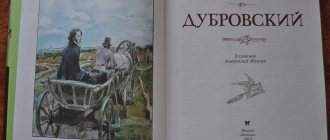- Essays
- 6th grade
- Lessons of kindness in the story French Lessons
Valentin Rasputin is a famous writer. He wrote many instructive works. One of them is the work “French Lessons” filled with kindness.
Rasputin wrote a story about a poor boy and a kind teacher who was ready to help. In the work, the author concluded several lessons of kindness, examples of morality and simply good people.
The poor fifth-grader was betrayed by his so-called friends immediately after his several victories in a children's game. He received a couple of blows from the older boy in the group. The next day, coming in with bruises on his face, he was afraid that the French teacher would find out everything and scold him. She really found out that the boy did not have enough money for food, and that he was forced to gamble for money. But the boy received only understanding and support from the teacher in his direction. This was the first lesson of kindness.
Lydia Mikhailovna tried to help the student in every way. She sent parcels of food, invited him to her house and treated him to dinner, but the boy did not accept her help. Being quite modest, the boy did not consider it right to accept “handouts.” The next lesson of kindness is that you need to be able to accept help if you really need it. But no matter how the teacher tried to feed the student, he did not agree and returned everything back.
Taking a risk, Lidia Mikhailovna offered a fifth-grader a game for money. She gave in to him so that he could win money and buy milk. One day the director caught them in the office playing another game and the teacher calmly admitted everything. Soon she returned to her hometown, but did not forget about the boy, just as he did not forget about her. The woman sent the boy a huge parcel containing pasta and apples, which the child had only seen in pictures.
The boy remembered his French teacher and class teacher for the rest of his life. Lidia Mikhailovna's kindness towards him became priceless for the boy. The teacher became the embodiment of a humane person. The work “French Lessons” proves the kindness of some people and gives hope that humane people still exist. The main idea of the story: you need to help others when they need it and believe that they will help you and will not leave you alone in difficult times.
6th grade
Other essays: ← If I were a wizard↑ 6th grade Lessons of kindness from the story The Horse with a Pink Mane by Astafieva →
Collect goodness bit by bit
The theme of goodness in the story “French Lessons” runs as a through thread - at first barely noticeable, but gradually blossoming into a bright pattern. The author does not miss a single smallest detail, imprinted in the memory of a teenager forced to continue his studies “fifty kilometers” from home:
- stingy Uncle Ilya, “who raked a bag of potatoes”;
- the driver Uncle Vanya, who encourages the boy after arriving at a new place and delivers him meager food;
- a mother who decided “despite all misfortunes” to continue her son’s education.
Many of the difficulties and injustices that the hero had to face while living “in the area” with Aunt Nadya, a “tired woman” who, like the boy’s mother, “ran around alone” with three children, are remembered without bitterness or resentment.
In the school literature curriculum, Rasputin’s story “French Lessons” with an essay-reasoning finale is taught in the 6th grade. Most often, an essay involves freely expressing the impressions received from reading a story in the form of an essay. This position allows students to show individuality in their views on certain events and give a personal assessment in accordance with their understanding of the situation.
A brief summary of the story with an emphasis on key points will help you freely navigate the topic, draw up a plan correctly and write an essay with your own thoughts.
Almost according to Gorky
Like Gorky’s “Childhood” and “In People,” Rasputin’s small work illuminates not only a fragment of a teenager’s life, but also reveals a whole layer of relationships in the post-war outback. In the story “French Lessons,” a person’s mercy is contrasted with the forced cruelty of society, caused by need and hunger, which “has not yet let go.”
The hero, living in someone else's family, notices that “a good half” of the products (bread and potatoes) that his mother gives him are disappearing . He understands that this is the work of the mistress or her children, but does not try to track down the kidnappers and is even afraid to “think about it.”
The boy’s only regret is that he is in vain tearing “the last one away from his own people.” The teenager comes to terms with the situation, realizing that informing his mother will not fix anything, but will only cause her pain. He shows mercy to a loved one and to those with whom he shares shelter, realizing that they are also in great need, which pushes them to unseemly acts.
School and street
Studying was quite easy for the hero. He could not imagine going to school without preparation or without “at least one lesson being learned.” He had straight A's in all subjects except French. The boy was unable to pronounce foreign words correctly.
When there was time left from classes, “homesickness set in.” Seeing off his mother, who came to visit him, he cannot stand it and runs after the car crying . The mother's heart trembles, and the woman wants to take her son home. But the boy thinks that with his weakness he will disgrace his mother in front of his fellow villagers, so he does not accept the offer and runs away.
A debilitating feeling of hunger forces a teenager to try his luck in a game for money. Occasionally he received a small sum from home for milk, which he was “ordered to drink for anemia.” But since the collective farm did not pay money, there was no hope of replenishing the daily ration. The village boys played “chiku” in a secluded place. After observing the process and practicing, the hero enters the game.
Winning enough to buy a jar of milk, he displeases the local ringleader Vadik, who is stronger and older. Having found a suitable reason, Vadik and his friend brutally beat the hero.
Classroom teacher
Most of all, the boy was afraid that the school would find out about the reasons for the abrasions on his face and would be expelled for playing for money. When asked by class teacher Lidia Mikhailovna, a French language teacher, about the causes of the injuries, he replies that he fell. But one of the classmates, a participant in the games himself, is not shy and informs the teacher about his classmate. She leaves the boy after school and asks him to stop playing for money. Lydia Mikhalovna was:
- very young;
- with attentive, slightly squinting eyes;
- neat and smart;
- beautiful in everything.
She is imbued with true sympathy for the boy, who, unlike the “well-fed loafers,” strives for knowledge and has abilities.
The teacher begins to study with the hero individually. First she does this at school, and then at home (under the pretext of short time between shifts). From a conversation with a student and the owner of the house where the boy lived, Lidia Mikhailovna understood the difficult conditions in which his family and he himself were. She is driven not only by the desire to help the student learn a foreign language, but also by compassion.
Home schooling
The teacher moves classes to her apartment, believing that she can feed the boy this way, but is up against the latter’s fundamental refusal to eat. This behavior at first even surprises and offends Lydia Mikhailovna, but then she decides to give up and act in a different way.
One day a package is brought to school. The boy is told that “some guy” delivered it. He understands that it could only be the village driver Uncle Vanya, but the appearance of the parcel - a “white plywood box” - is surprising, and the contents - pasta, sugar, hematogen - are alarming. The teenager realizes that the package is not from his mother, and after some thought he guesses the true sender. He returns the parcel to Lydia Mikhailovna, despite her persuasion to accept the products.
Having failed, the teacher does not abandon her intentions to help the student in any way. She seems to accidentally remember the childhood game “walls,” which involves throwing coins against the wall so that they land as close as possible to the opponent’s coin. If the thrower reached both coins with the spread fingers of one hand, he took them for himself.
Lidia Mikhailovna draws the boy into the game and even imitates cheating on her part so that he believes that the winnings are honest. Thanks to this, she gives him the opportunity to “honestly win” to get money for bread and milk. But one day the school principal unexpectedly finds them playing. Seeing this, he is full of bewilderment and indignation. The teacher takes the blame upon herself, resigns and leaves for her small homeland.
At the last meeting, which took place on the eve of departure, Lidia Mikhailovna calms the boy down, promising that “no one will touch him” for the “stupid incident.” “Study,” is her last instruction to her student.
Good deeds in Rasputin's story
“French Lessons” is one of my favorite books. In a touching story, the writer told about the hardships of life of a simple village boy and the teacher who left an indelible mark on his soul. Rasputin's story is autobiographical - in it he described his teacher, whom he remembered for the rest of his life thanks to her main spiritual quality - kindness .
The work tells the story of a teenager from a poor family who comes to study in the regional center. Far from home, the boy suffers, but most of all he is tormented by hunger - at that difficult time, the country had not yet recovered from the consequences of the war. The mother helps her son, but the potatoes and bread sent from the village do not last long. The boy starts gambling for money to earn at least a little money for milk. He wins, but the other boys are unable to accept their losses, so they soon beat him up and drive him away.
A kind young French teacher finds out that her student is gambling, but does not betray him to the principal. She feels sympathy for the hero and tries to help. The teenager, out of pride, rejects her care, but gradually Lidia Mikhailovna finds a way to help the boy, offering to play with her for money. When the director finds out about this, the young teacher takes the blame. Lidia Mikhailovna is kicked out of school, she goes home, but after a while the hero receives a package from her.
As in all of Rasputin’s works, women are given a special place in “French Lessons”. It is no secret that it was with women that the writer associated everything beautiful and human in our world and saw in them the salvation of humanity.
This is how Lydia Mikhailovna appears in the story - she became the embodiment of kindness, compassion, mercy and selflessness . She is not just a teacher, but a person with a capital letter. Her kind-heartedness did not allow her to indifferently observe the fate of the talented boy.
Through her actions, the teacher opened the path to a bright future for the hero. It was kindness that saved a half-starved child from a poor village family from harm. If she had not taken such a part in his fate, who knows how the teenager’s life would have turned out. Perhaps he would have continued to play for money with the guys and was expelled from school in disgrace, or maybe he himself dropped out of school and went to the village so as not to die of hunger.
In his work, Rasputin wanted to show how important it is to be responsive, kind, and compassionate to one’s neighbor, especially in such difficult times. A person should help others, because this is the only way to change the world for the better.
Moral of the story
The main idea in the story is the power and dedication of human kindness. Kindness of the heart, which does not require gratitude and praise, defies logic:
- The teacher takes part in the fate of one of the students, seemingly without any reason, only at the behest of her soul.
- She uses little tricks to somehow ease his situation, feed him, and distract him from homesickness with confidential conversations.
- Some time after leaving for his small homeland, Lidia Mikhailovna sends the boy a parcel with pasta and apples.
It is clear that the teacher did not expect any rewards or favors in return. On the contrary, she tried to make sure that the teenager did not perceive her participation as a handout. She risks complicating her position as a teacher and incurring the “righteous wrath” of her superiors, which is what happens, but she does not regret her action at all and does everything to prevent the incident from affecting the student.
Rasputin received these lessons of kindness in his school childhood. Thanks to them, he carried his caring attitude towards people throughout his life.
Tips for writing an essay
The story “French Lessons” is one of the most striking examples of kindness and mercy in Russian literature. To write a good essay, it is recommended to make a plan before starting work:
- Brief summary of the story.
- Examples of good deeds in the work.
- Why is kindness important in a person's life?
An essay on Rasputin’s “French Lessons” is written in the form of a short essay. This type of work will be very useful for future graduates, since the topic of kindness often becomes the subject of the final essay, which is an admission to the Unified State Exam. To get a high mark on the exam, it is recommended to read other works that reflect this topic:
- The story of A. I. Kuprin “The Wonderful Doctor.”
- The story of A. S. Pushkin “The Captain's Daughter”.
- L. N. Tolstoy’s novel “Childhood”.
- The story “Poor Liza” by N. M. Karamzin.
- The story of M. A. Sholokhov “The Fate of a Man.”
- The story of A. I. Solzhenitsyn “Matrenin’s Dvor”, etc.
The list goes on and on. Russian and foreign literature is replete with arguments for writing an essay on the topic of kindness. In addition, it is recommended to study quotes from great people - writers, philosophers, poets.
Essays on Getsoch.ru
Essay on the topic “Lessons of kindness in the story “French Lessons”
Subscribe to our VK group
In life there are a lot of kind and humane people who selflessly help others, sharing the warmth of their hearts. Sometimes such people—“fireflies”—are found among those who initially seem alien and distant.
The French teacher became such a person for the boy. She was a real Teacher with a capital T of the word, as she taught the boy not only French pronunciation and new foreign words, but above all she taught him “lessons of kindness.” And these lessons are much more important and valuable than knowledge of a foreign language.
Teacher Lidia Mikhailovna is an example of a selfless person with a big and kind heart. She imbued with the situation of her student, who was starving. Having seen him beaten one day, she began to ask him what had happened to him. The boy was betrayed by classmate Tishkin, who said that Vadik from the seventh grade had beaten him.




